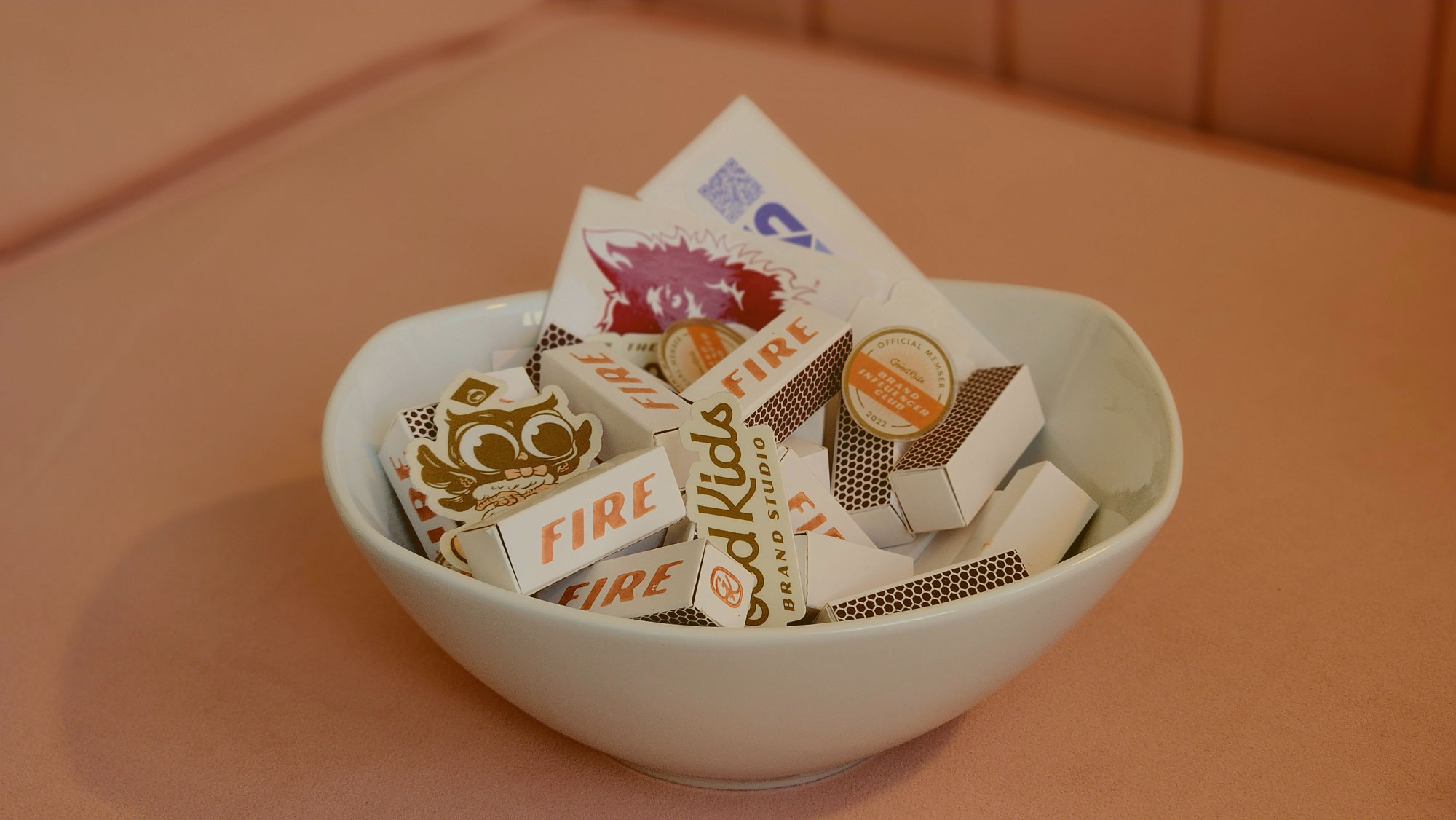

We’ve all heard of the term “power couple.” No, we’re not talking about Beyonce and Jay-Z…
We’re talking about the power couple of the business world: branding and marketing.
While brand and marketing can exist independently, when they join together, they create a force that can take your business to new heights. Today, we’re diving into six clear ways branding improves marketing – giving your campaigns more clarity, cohesion, and long-term success.
If you’re looking for actionable ways branding improves marketing, you’re in the right place — let’s break it down.
The Branding + Marketing Relationship
Before we dive in, let’s quickly recap the difference between branding and marketing…
Branding is all about making people feel something: who you are as a company: your identity, values, and the emotions you evoke.
Marketing is about making people do something. It’s how you communicate your identity to your audience and persuade them to engage with you.
When these two elements align, magic happens. Here’s 6 ways that branding empowers marketing.
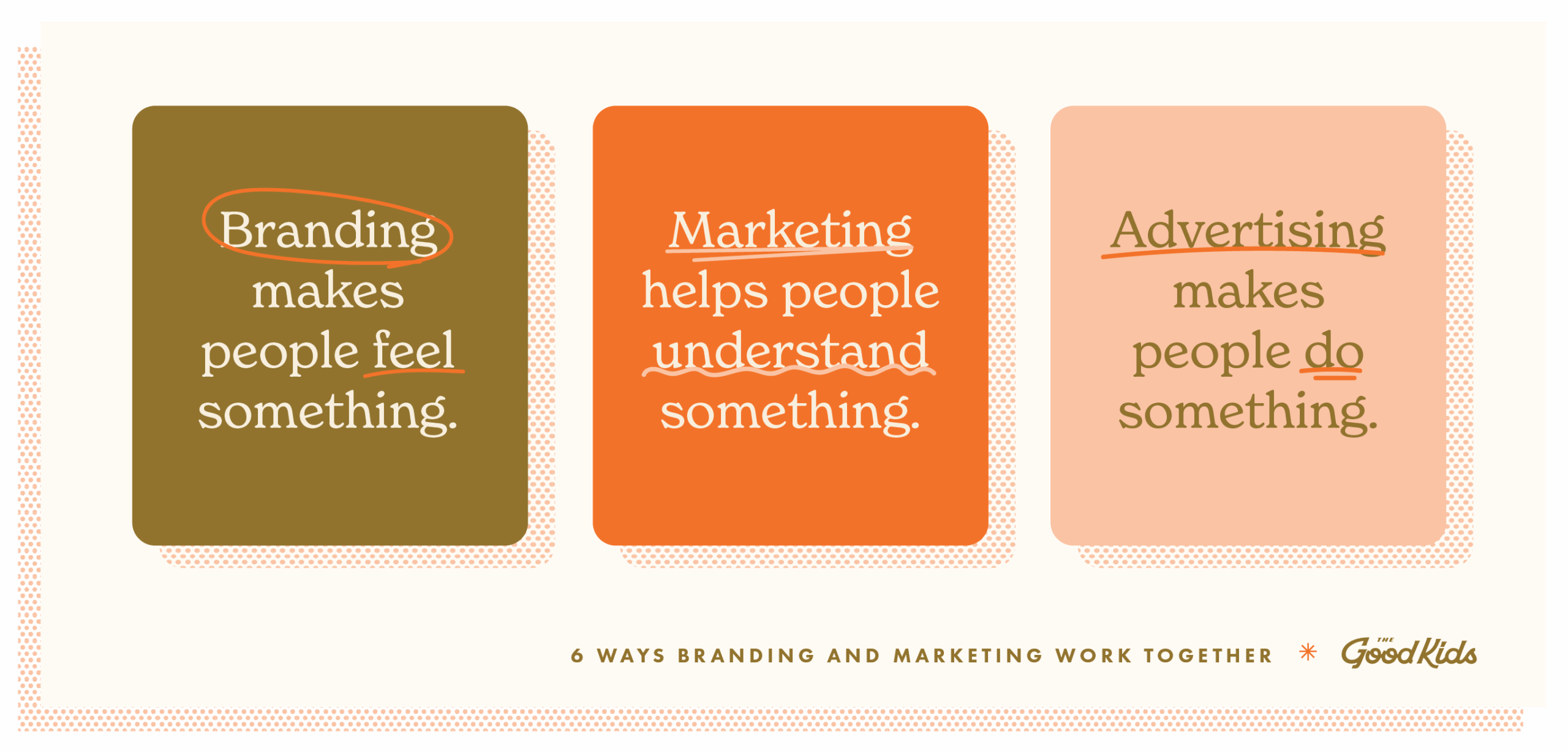
1. Branding Provides a Solid Foundation
A strong brand gives your marketing efforts a strong platform to build upon. A solid foundation results in four core things that marketing can thrive on:
- Consistency: With clear brand guidelines, your marketing team can create cohesive campaigns across all channels. According to Lucidpress, companies can experience a 33% increase in revenue just from a consistent brand presentation.
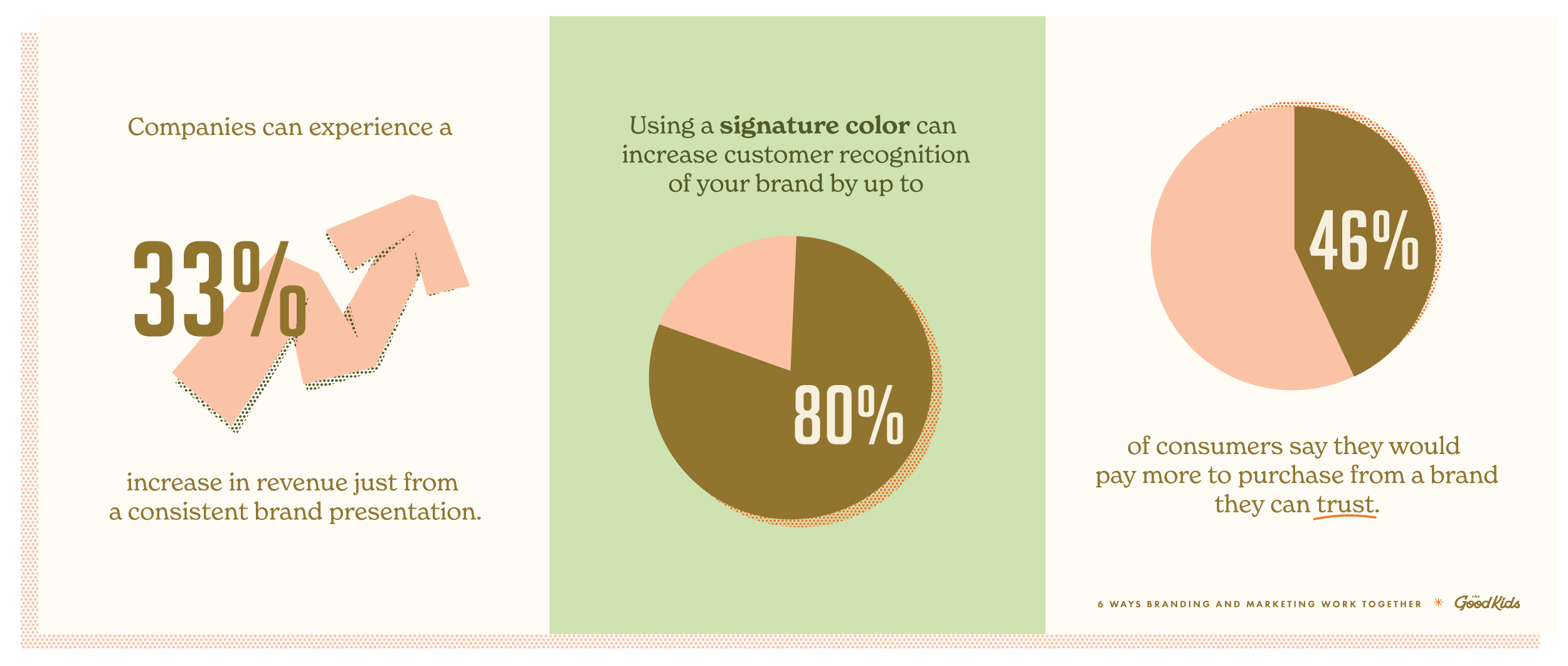
- Recognition: A memorable brand makes your marketing materials more recognizable, thus increasing its impact. Using a signature color can increase customer recognition of your brand by up to 80% according to Startup Bonsai.
- Trust: A well-established brand makes your marketing more credible, which makes it more persuasive. In fact, Salsify found that 46% of consumers say that they would pay more to purchase from a brand they can trust.
- A Focused Budget: A strong brand requires less of an advertising and marketing budget. A well-designed, strategically-aligned brand works as a free salesperson 24/7. Additionally, with a professional brand guide in hand, you’ll have rules and guidelines to provide to vendors that outline how to work with the brand elements. What does this mean for you? Less dollars and time wasted.
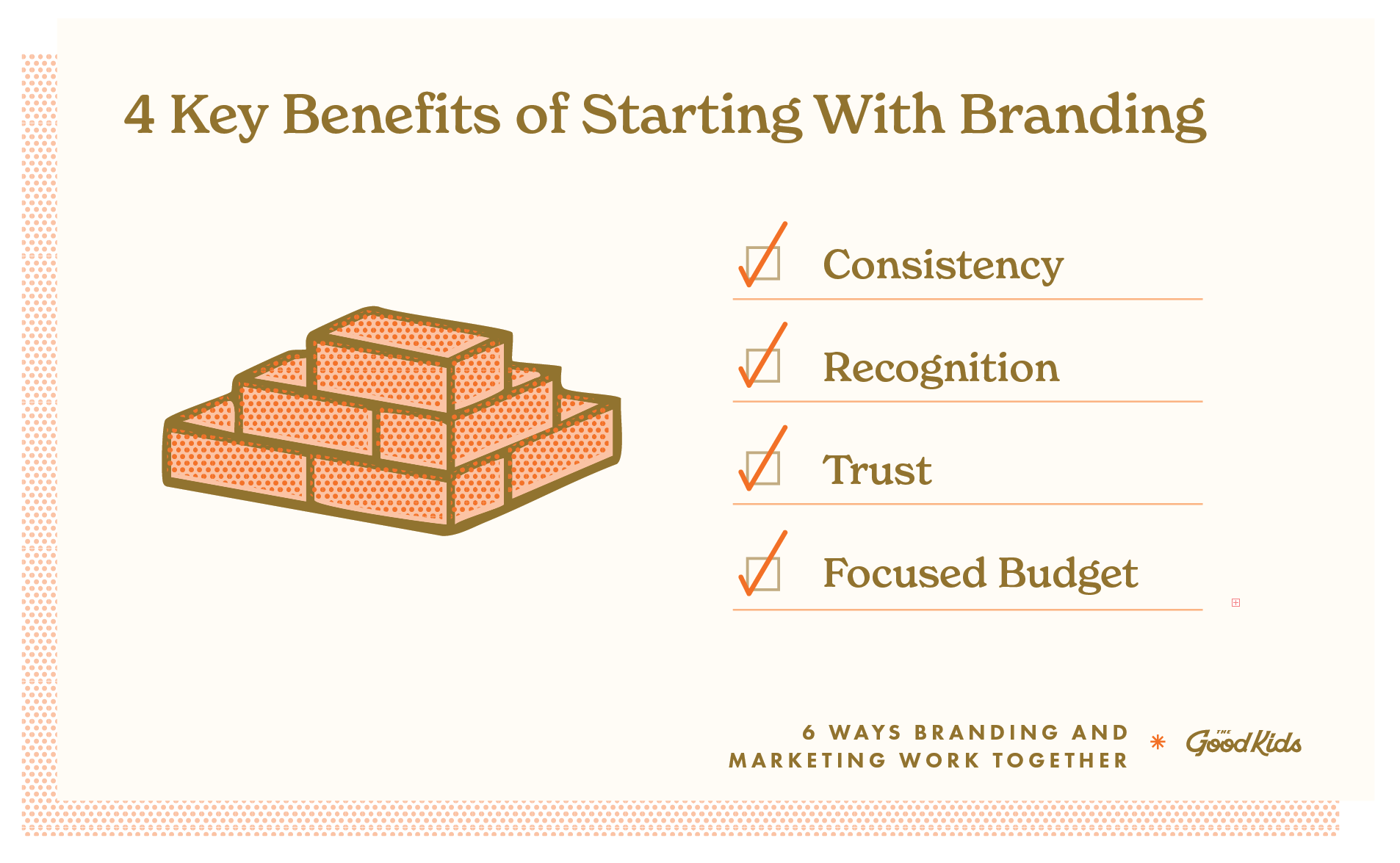
2. Branding Informs Marketing Strategy
As a marketing leader, you know that decisions can be time-consuming.
“Am I making the right decision for today and tomorrow?”
“Will this resonate with who I need it to?”
These might be questions you’ve asked yourself.
A strong brand provides a foundation for decision making. It not only speeds up the process, but also gives you the confidence to make decisions with clarity and assurance.
Here’s four ways brand strategy helps your marketing:
- Differentiator/Value Proposition: If you don’t know what you’re offering, your audience won’t know why they should care. A strong brand strategy clearly defines what sets your business apart, and why that matters to your customers. It aligns your offering with their emotional needs, making your value proposition not just clear, but compelling.
- Target Audience: Your brand helps define your ideal customer, allowing for more targeted marketing (which saves you $$$). Psst, want a headstart on defining your target customer? Start here with our FREE Targeted Customer Profile.
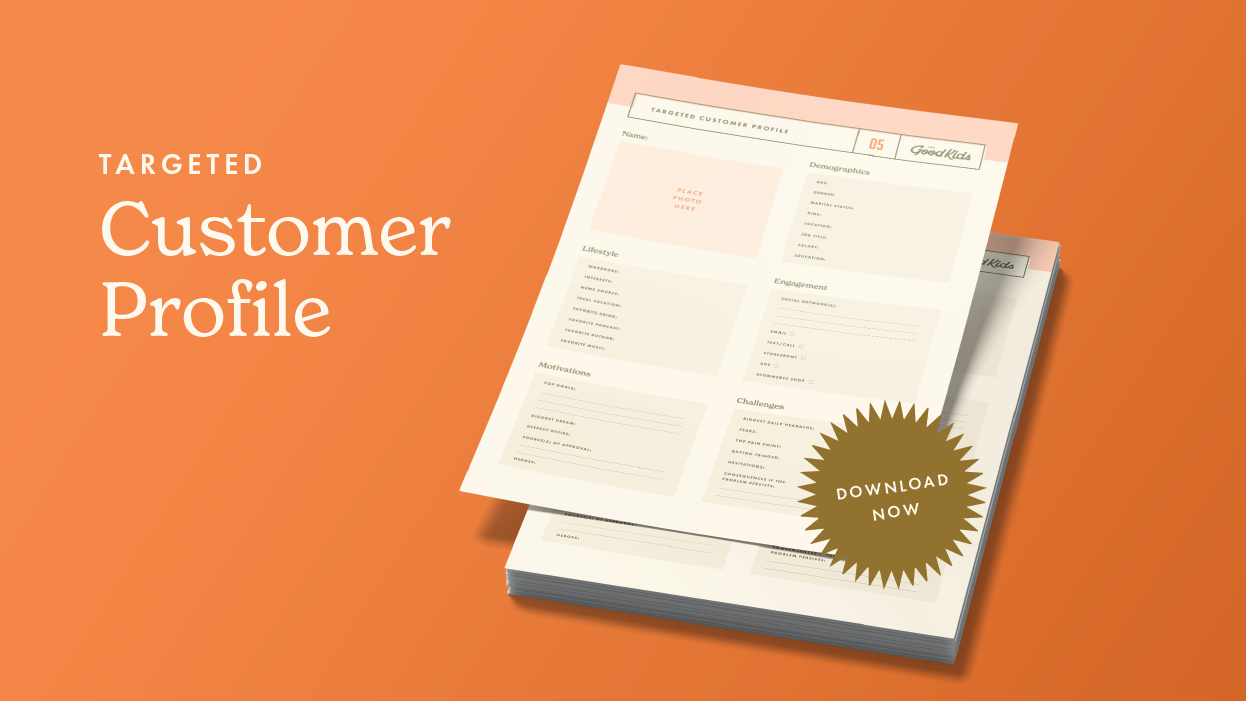
- Tone of Voice: Your brand personality determines how you communicate best with your audience, ensuring you’re only using talking points and headlines that will produce results.
- Channel Selection: By understanding your target audience, it helps determine which marketing channels are worthy of your time and money. For example, if your target audience is snowbirds in their 70’s, you probably shouldn’t be trying to reach them on TikTok.
3. Branding Enhances Emotional Connection
While marketing can inform and persuade, branding adds an emotional layer that can significantly boost the effectiveness of your campaigns. According to Persuasion Nation, the rate of customers who recommend a brand based on emotional connection is a whopping 71%! These examples aren’t just theory — they’re proven ways branding improves marketing across industries and audiences.
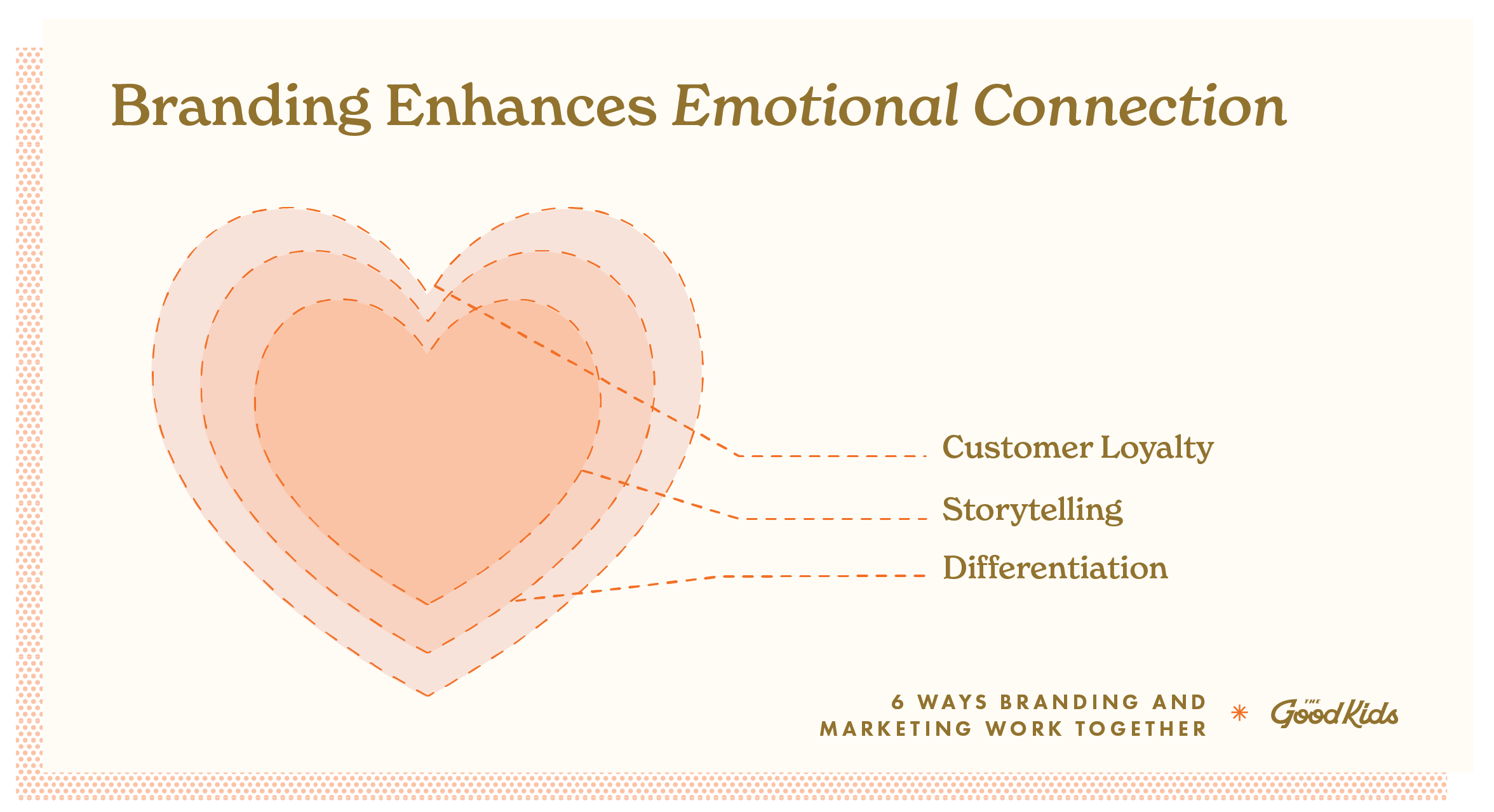
Here’s how emotional storytelling can help marketing efforts:
- Brand Loyalty: Customers who connect with your brand are more receptive to your marketing messages and more likely to become brand advocates. Startup Bonsai found that a whopping 62% of customers today feel emotionally attached to their favorite brands!
- Storytelling: A strong brand provides a narrative for your marketing efforts, making your messages more engaging and memorable. In fact, 55% of people are more likely to buy a product if they love the brand’s story.
- Differentiation: In a crowded market, your brand helps your marketing stand out quickly by highlighting what makes you unique!
4. Branding Supports Long-Term Marketing Success
While trendy marketing campaigns come and go, your brand remains constant, which builds trust over time. A quality brand should last 10-20+ years so while your marketing campaigns change to the season, culture, and new product trends, your branding can be an ever constant compass.
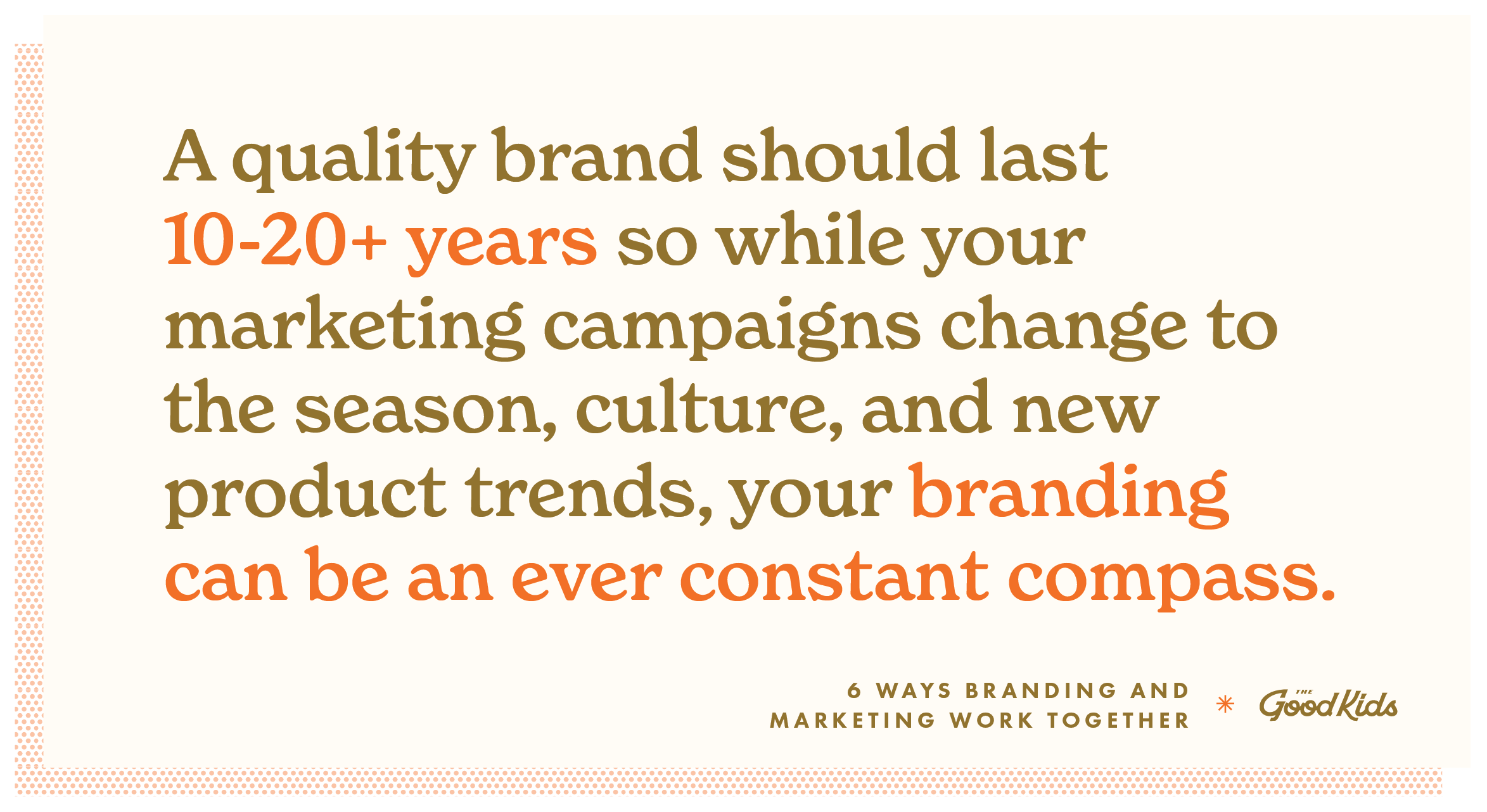
Here’s how branding helps long-term success:
- Brand Equity: A strong brand adds value to your products or services, which allows for premium pricing! According to a study by Neilsen, 59% of consumers prefer to buy new products from brands they are familiar with, which underscores the value of strong brand equity that allows for premium pricing.
- Marketing Efficiency: With a well-established brand, each marketing effort builds upon previous ones growing an audience of ideal leads, increasing overall effectiveness and creating a tidal wave of success that will only grow. Research by Forrester indicates that consistent branding across all platforms can increase revenue by up to 23%, demonstrating how a well-established brand can enhance marketing efficiency and effectiveness.
- Resilience: A solid brand can help your marketing efforts weather storms and recover more quickly from setbacks. When you have a strong, loyal following, a minor setback won’t collapse the business. A report by Harvard Business Review found that companies with strong brands recovered 18% faster from economic downturns than those with weaker brands, highlighting the resilience a solid brand provides.
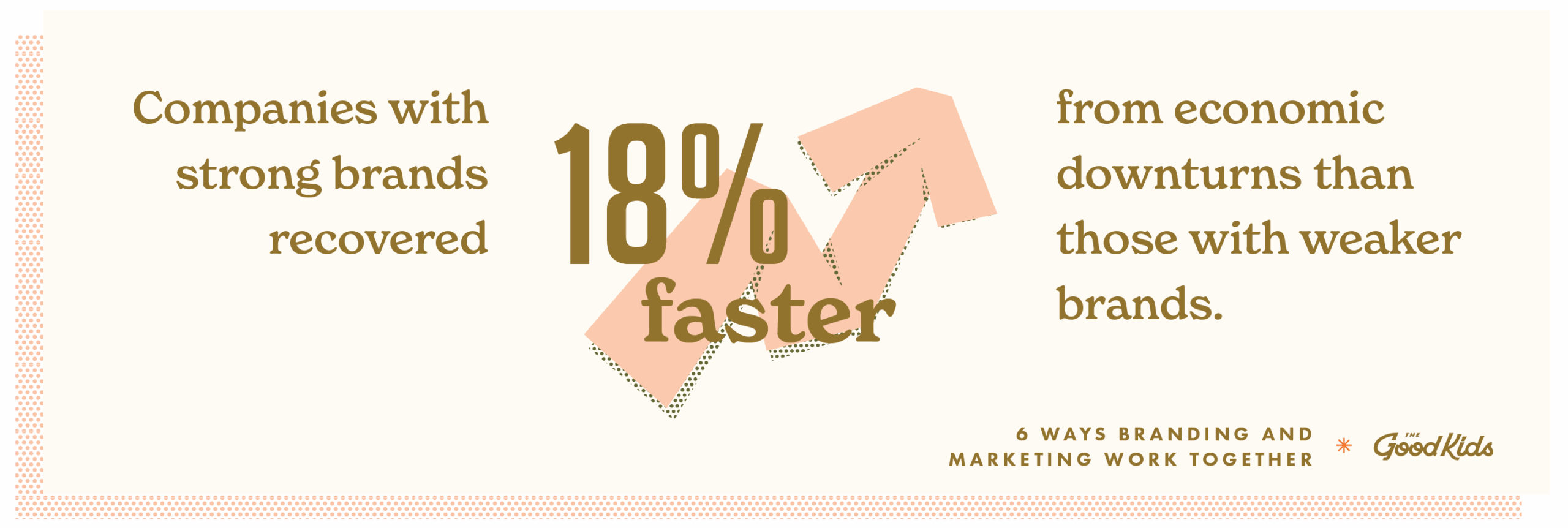
5. Branding Facilitates Word-of-Mouth Marketing
One of the most powerful forms of marketing is word of mouth. If your brand is strong enough, your customers will do it at no cost to you! What a dream, right? It can be a reality! Here’s how to use branding to gain word-of-mouth referrals:
- Memorability: A distinct brand is easier for customers to recall and recommend to others in natural, everyday conversation. A study by Journal of Marketing Research found that distinctive brand assets increase brand recall by up to 52%, making it easier for customers to remember and recommend the brand.
- Experience Consistency: When your brand promise aligns with customer experience, it encourages positive word of mouth as you’re giving genuine moments of delight to your customers. According to PwC, 73% of consumers say a good experience is key in influencing their brand loyalties, highlighting the importance of aligning brand promise with customer experience.
- Community Building: Strong brands often create a sense of community among customers, which creates organic marketing. When you give first and lean into your mission, your “tribe” will be drawn in and share with others. Research by Harvard Business Review shows that brands that create emotional connections with customers see a 306% higher customer lifetime value, emphasizing the power of community in driving organic marketing.
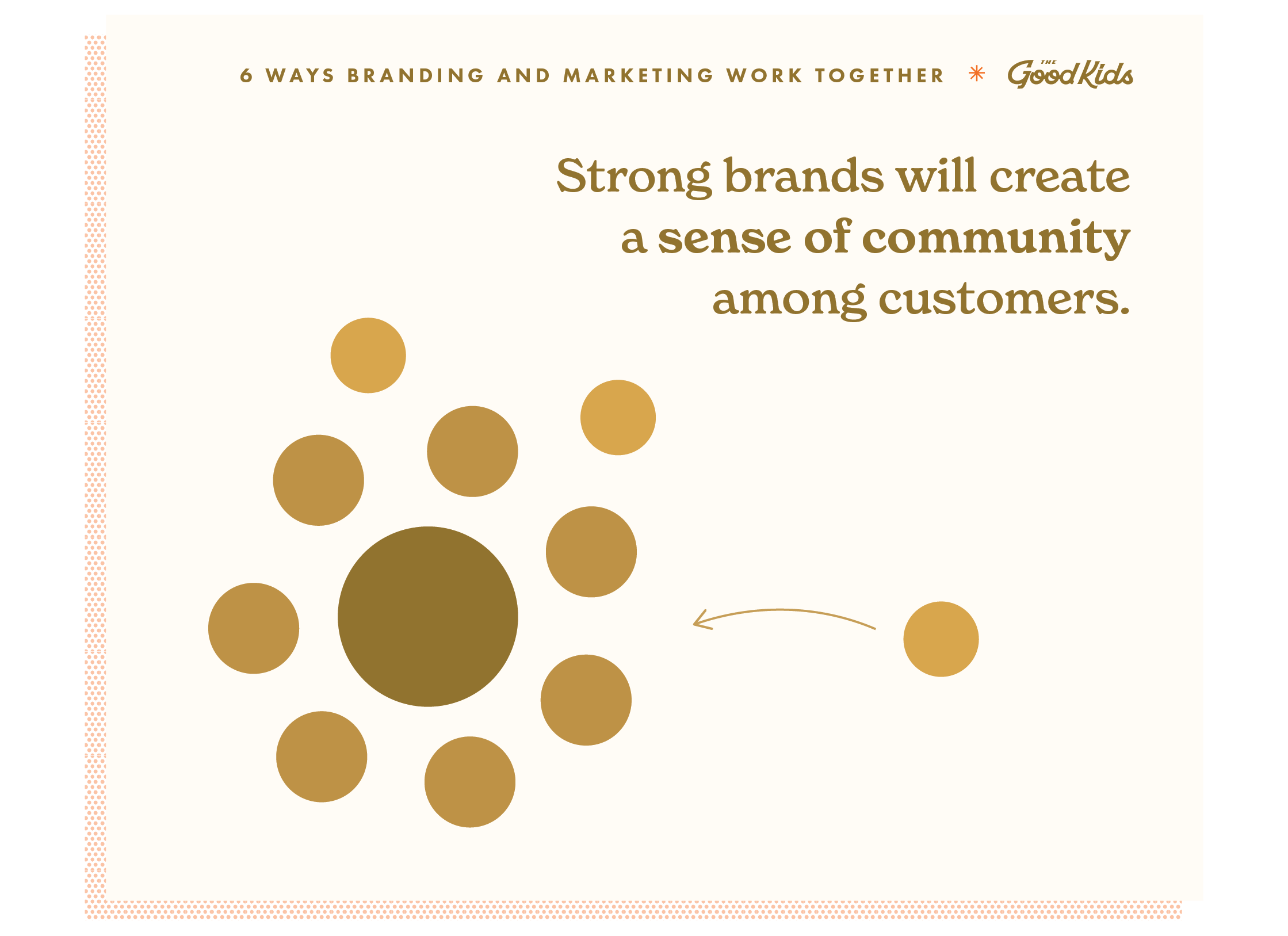
6. Branding Improves Retention
What’s wrong with a new customer? Absolutely nothing! But retaining existing ones is always more cost effective. According to Forbes, acquiring a new customer can cost five to seven times more than retaining an existing one. Branding plays a key role here in two major ways:
- Customer Loyalty Programs: A strong brand can make loyalty programs more attractive and effective as they reward client retention with fun incentives that brings even more joy to their customer journey.
- Personalization: Understanding your brand allows for more personalized marketing efforts that resonate with existing customers.
And to that point, a strong brand doesn’t just resonate with customers when things are going right – it also allows for personalized support when things go wrong. By addressing issues in a way that feels tailored to the customer, you can turn a negative experience into an opportunity to strengthen loyalty, making the customer even more committed to your brand. It’s a win for everyone!
- Employee Retention: Internally, a strong brand does more than guide external perception – it builds connection. When employees identify with your brand, they feel a greater sense of pride and purpose. That connection fuels loyalty, boosts morale, and turns team members into advocates.
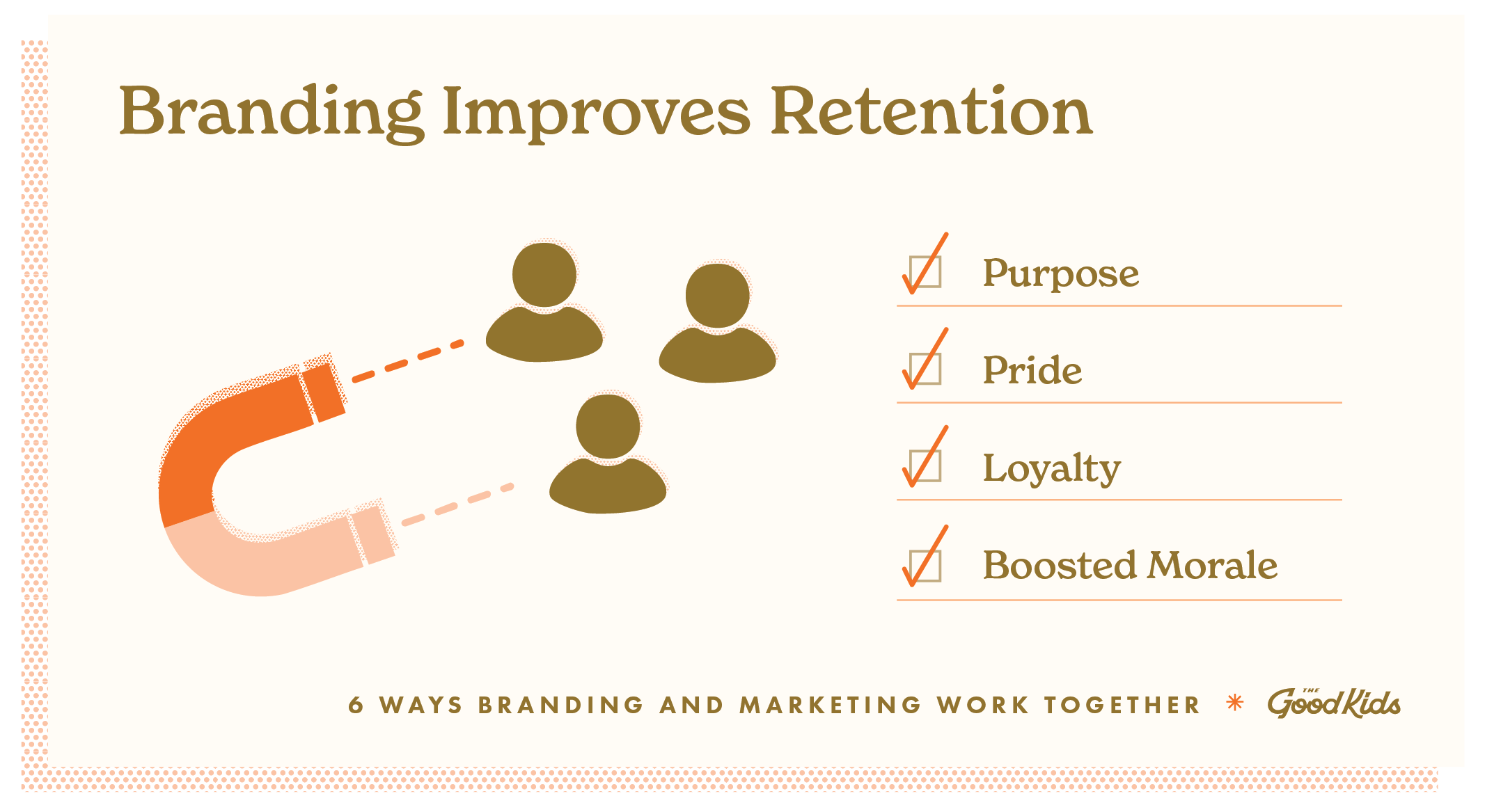
Align Your Branding and Marketing
Amazon founder Jeff Bezos once said, “Your brand is what other people say about you when you’re not in the room.” So, as you plan your next marketing campaign, remember: the most effective strategies begin with brand. The six ways branding improves marketing we’ve shared here can be the difference between a forgettable effort and a lasting impression.
So, as you plan your next marketing campaign, take a moment to consider your brand.
Is it lacking? Do you know who you are and what makes you stand out?
Get started with our FREE Ultimate Brand Essentials Kit.
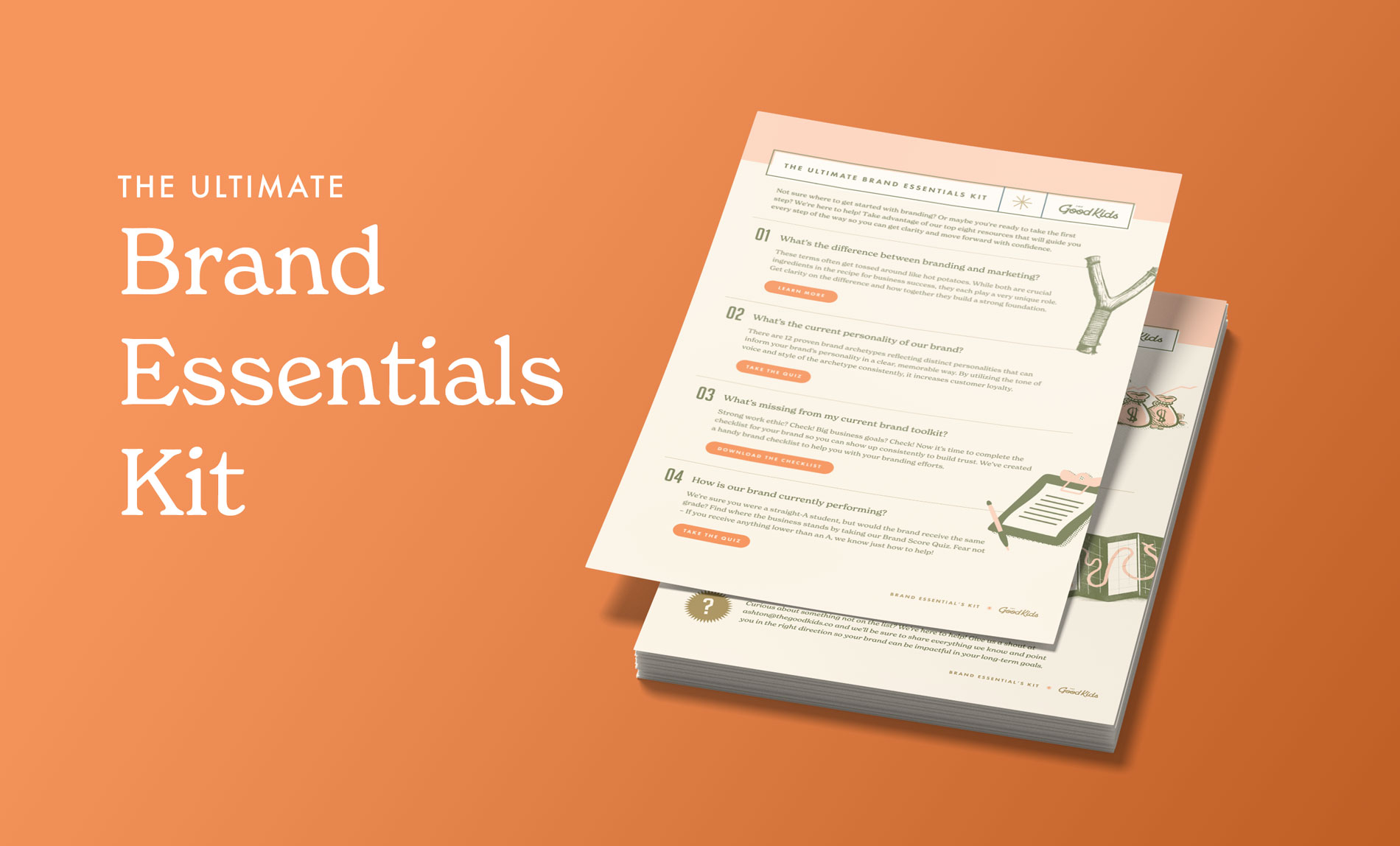
We turn vision into velocity. If you’re ready to bring your idea to life, let’s talk.
